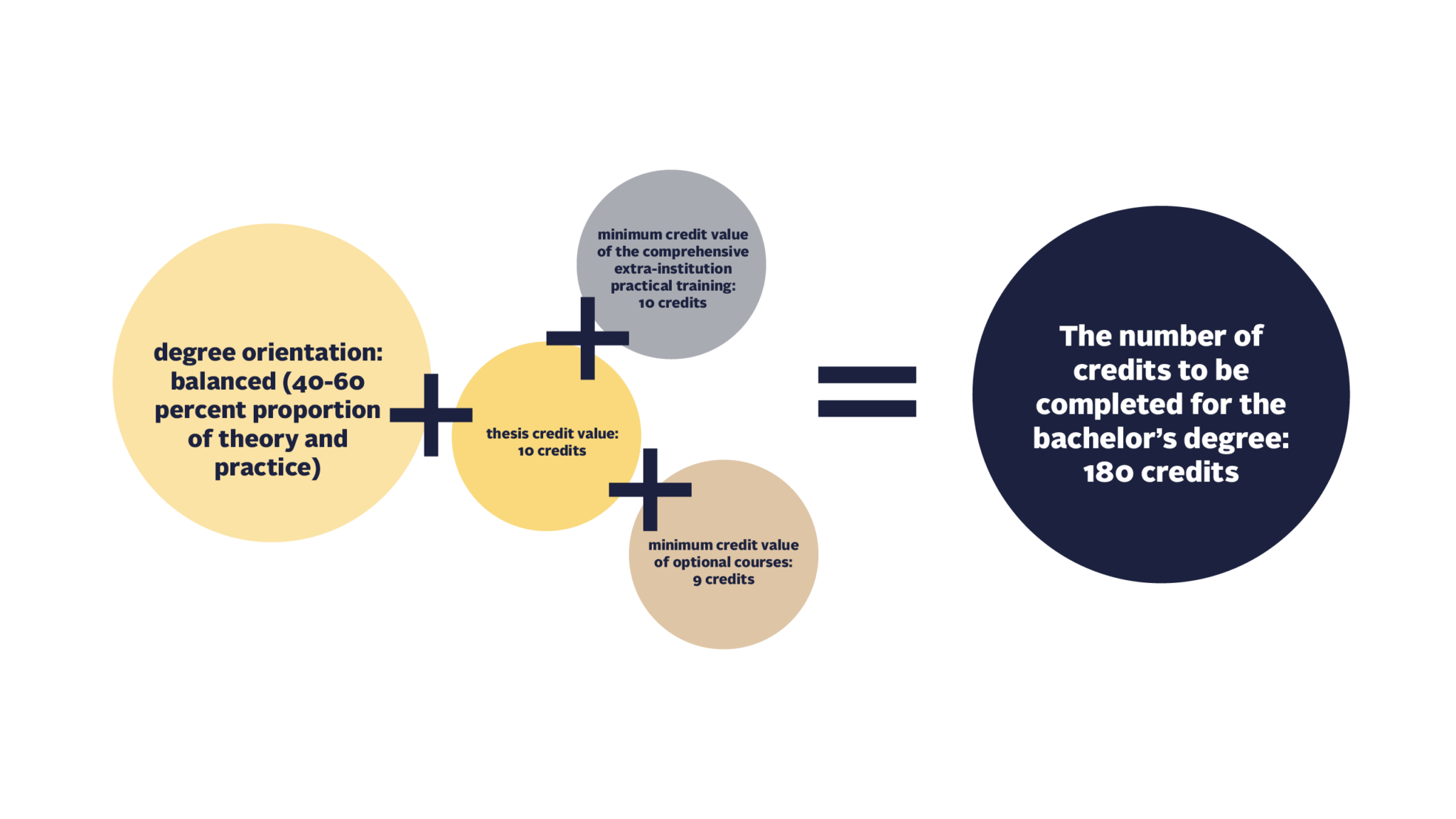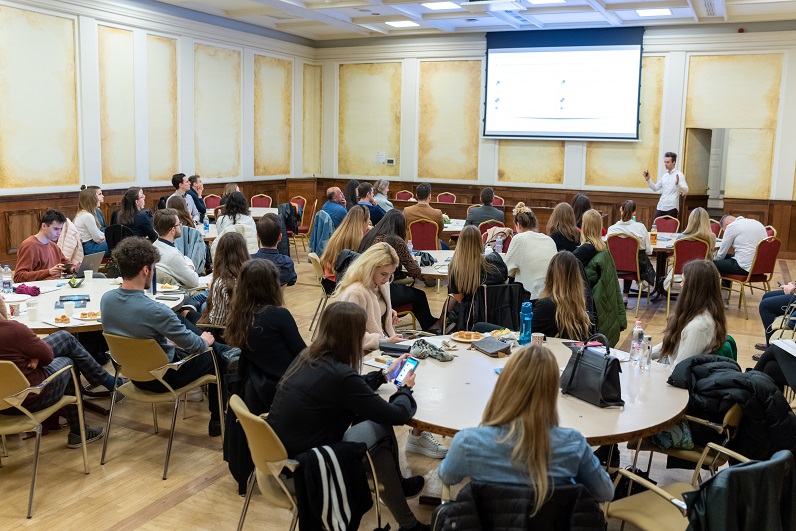BA in Communication and Media Science
for current students
Welcome to the Communication and Media Science HUB!
Offices
Tamás Bokor PhD, program director: E.3.329/a
Email: tamas.bokor@uni-corvinus.hu
Krisztina Gabriella Zieger, program coordinator: E.3.329
Our aim is to help you find your way around the university and learn more about the procedures. Find below a simplified process flow that takes you through the 6 semesters:
Semesters 1-2: Foundation subjects (Physical Education also recommended)
Semesters 3-4: Degree-specific subjects (Internship recommended in the 4th semester)
Semesters 5-6: Specialization + Thesis + Final exam
The number of credits to be completed for the bachelor’s degree: 180 credits
- degree orientation: balanced (40-60 percent proportion of theory and practice)
- thesis credit value: 10 credits
- minimum credit value of the comprehensive extra-institution practical training:10 credits
- minimum credit value of optional courses: 9 credits

Please keep in mind that you are required to follow the training program valid in the school year of your admission! That is why you can find the training programs of different academic years here:
It is recommended to include the subjects in the schedule according to the sample curriculum, which can also be found in Neptun. The student may deviate from this, taking into account:
- the pre-study order,
- semester of announcing subjects
- completion of an average of 30 credits per semester
- in addition to the compulsory subjects, students may take elective subjects from the pool of elective subjects (see Neptun) as well as foreign languages.
- a minimum of 2/3 of the required credit amount must be completed at Corvinus University.
*: Hungarian Language is a compulsory subject for the students participating in the Stipendium Hungaricum scholarship program in the first two semesters.
The detailed rules related to the admission of the subjects and the completion of the subjects are included in the Study and Examination Regulations!
Physical education
Physical education is a criterion subject, the condition for obtaining a diploma is the completion of two semesters. The two semesters of physical education can be completed at any time during the program. Students who have fulfilled the criterion can only take the subject for a reimbursement fee.
Intensive week
During the intensive weeks, students study a course they have chosen for the intensive week following a special teaching metholodogy. No other subject is taught during the intensive weeks.
Students can study the project subject in more depth, with more focus on project work.
In Neptun, these project courses are marked with a “-P” at the end of subject code, for example E01-P, G02-P.
Students can apply to these courses during the normal subject registration period.
Language requirements
Students of BA in Communication and Media Science are not required to take a competency test, since they study in English.
However:
During their studies, students can study a foreign language as an elective subject for two semesters free of charge. Please note that learning a language for specific purposes is strongly recommended. Once the two semesters have been completed, students can only take additional language courses if they pay a fee for the course.
More information on elective language courses
To increase the effectiveness of language learning and reduce the time it takes to reach the level required for the language exams, we recommend that you take extra language classes (one or two time slots per week) for a fee.
In addition to the free language courses, a number of paid courses (0 credits) are available for those who wish to learn more languages.
Scholarship
Corvinus University of Budapest offers you a number of social needs-based and academic type of scholarships with various support options. You can find all the essential information on the Corvinus landing page about the types of scholarships available at the University!
Apply to become a teaching assistant (demonstrator)!
The teaching assistants may be involved in the teaching and research activities of the University’s institutes and research centers during their university years. They may be involved in activities that support teaching such as searching for scientific sources and data and processing, case studies to update teaching materials etc., while they can also be involved in event organization activities of the department.
Teaching assistant activities help to deepen students’ professional knowledge and to stimulate their interest in academic teaching and scientific work.
Why is it worth becoming a teaching assistant?
Being a teaching assistant looks very good on a CV, it is also an advantage when applying for certain scholarships and, as a result of intensive professional work, it offers the opportunity to write a high quality TDK paper or thesis.
If you are interested in becoming a teaching assistant, keep an eye out for the official call for applications before each semester.
More information on the position and on how to become a teaching assistant can be found below.
Scientific Students’ Associations Conference (TDK)
What is TDK?
The Scientific Students’ Associations Conference (known as TDK) provides a public forum for student publications which go beyond the core syllabus and represent a high scientific standard. Our aim is to assist the scientific and professional career of the authors and to help improve scientific thinking and discussion. The papers are completed with the help of a consultant and the students present them in sections similarly to scientific conferences. The papers and presentations are judged by a professional jury, according to requirements and standards of scientific publications.
TDK is a two-stage competition for students (both undergraduate and graduate) interested in the world around them.
- The first stage is about finding an interesting research question and conducting an appropriate research to answer this research question. The output is a paper (around 20–60-page long) to disseminate the findings.
- The second stage is the oral round, where participants will present their findings in front of an academic jury.
Specializations
Specialization selection rules:
There is no such rule because there is only one specialization.
The name of the specialization is Organizational Communication.
The specialization constitutes theoretical and practical knowledge that makes students capable of working on the given field, improves personal abilities, and results in specialized competences relevant to individual interests. The credit value of optional courses within studies of the practice and theory of communication is 40-44 credits.
Application for the specialization is due in the 4th semester.
Internship
Internship requirements:
Internship is at least 80 hours, spent in institutions in the various fields of communication, defined in the Study and Examination Regulations.
International opportunities
Would you like to study abroad? We recommend the 3rd and 4th semesters for it. These international opportunities are waiting for you at Corvinus University. Apply for the Pannonia Scholarship Programme, bilateral programs or to the university of your choice as a Freemover! Winter and summer universities are also waiting for your application abroad!
You can study at our prestigious partner universities and also gain international experience that will be advantageous in your future career. During your studies abroad, you can deepen your professional knowledge and build international connections that you can leverage in your career.
IMPORTANT!
Before applying, please make sure to thoroughly read the relevant year’s application guidelines, usually published in the fall semester. The requirements change from year to year, so it’s worth taking the time to review them carefully.
For more detailed information, click here!
Pannonia Scholarship Programme
Among the main focuses of the Pannonia Scholarship Programme are the development of key competencies and skills, as well as the support for improving existing language skills..
If EU funding is not available during the outbound trips, we will be able to provide scholarships from other sources for international partial studies at partner universities to a similar extent as Erasmus+ support. In December 2023, the Government of Hungary established the Pannonia Scholarship Programme. The Maecenas Universitatis Corvini (MUC) Foundation, which supports Corvinus University of Budapest, also provides funding for students travelling abroad for international study.
Apart from the Pannonia Scholarship Programme (bilateral programs)
Corvinus University has outstanding internationally recognized partner universities not only in countries covered by the Pannonia Scholarship Programme but also worldwide. This allows you to spend your semester abroad not only within Europe but also in places like Australia, Singapore, the USA, or even Brazil. Currently, there is no Erasmus+ scholarship available to cover the costs of studying abroad, and we will keep you informed about any available funding options.
It’s essential to know that financial support for bilateral programs is not automatic. Therefore, we recommend applying for these opportunities if you can secure financing from other sources for your international semester.
Who is eligible?
As an undergraduate student, you can apply as early as your first semester.
Why should you apply?
Through the Pannónia Scholarship Programme and bilateral programs, you can study as a guest student at one of Corvinus University’s internationally recognized partner universities. Credits earned during your foreign studies can be transferred to your home program. By carefully selecting the universities you apply to, you can fulfill both mandatory and elective courses while abroad. During your semester abroad, you can gain valuable professional and cultural experiences, improve your language skills, and build international friendships at prestigious foreign universities.
Where to apply?
You can apply for partial studies abroad through the Mobility Manager system.
For questions about the programmes, travel, travel, finances and scholarships, students can use the Do it Online! application via MyCorvinus HUB.
Thesis
Degree thesis
The aim of the degree thesis is to demonstrate the student’s knowledge and expertise in a chosen topic, scientific data collection, systematization, analysis and processing related to the chosen topic, discussion of the chosen phenomenon or problem, hypothesis creation, problem solving, analysis of alternative hypotheses, argumentation and in refuting the counter-arguments, in a coherent, consistent, language-oriented written explanation of his thoughts, views, positions, statements.
Type of Degree thesis: Research thesis
Final Exam
a) obtaining a final certificate (The University will issue a final certificate to the student who has obtained the study and examination regulation prescribed in the curriculum, and the required internship (professional experience), the required credits. 12. Conditions for admission to the final examination
b) submission of the dissertation by the deadline,
c) evaluation of the dissertation with a different grade than the deadline,
d) registration for the final exam by the deadline,
e) the student has no overdue payment debt to the University for the given training,
f) accounted for with assets owned by the University (borrowed books, sports equipment, etc.).
A student who has not fulfilled any of the provisions of the points a)-f) cannot be admitted to the final examination.
The final exam consists of the defense of the dissertation and the oral complex exam.
Who should I contact?
Study Administration by the Student Services
Program Coordinators at the Student Administration Office will provide you with the most up-to-date info on degree programs, exam periods, academic schedules, mandatory internship, specialization selection, final examination process, etc. from enrollment to graduation. They are responsible for generating and maintaining the most accurate personal and academic records of the students in the University’s official student database (Neptun). Your dedicated Program Coordinator will guide you through your entire student life-cycle from registration to diploma hand-over. Let it be student card, exam registration, administrative fee payment, Neptun requests or change in your personal data/documents feel free to contact us. Office hours, contacts and online help is available on Corvinus’s official website.
The digital platform for study administration is Do it Online! where students can find comprehensive information about Student Services on topics such as:
- certificates,
- student ID,
- changes to personal data,
- requests,
- subject registration, study period,
- intensive week,
- assessment and examinations,
- final exam, diploma,
- IT systems
- Erasmus related question -> DoItOnline/International Opportunities or tamas.bokor@uni-corvinus.hu
- finance related question -> DoItOnline/Finance, Payments and Scholarships
- Neptun issue -> DoItOnline/Technical Problems – Neptun, Moodle, Teams, CUSMAN – DoItOnline
- questions related to requests-> DoItOnline/Requests
- general study related question -> DoItOnline/Student Office
The Student Services can only accept all electronic correspondence from the firstname.surname@stud.uni-corvinus.hu email address, unfortunately we cannot accept correspondence from private email addresses.
More information on in-person and digital study administration
If you are still looking for an answer after checking the website, contact Tamás Bokor, PhD (programme director), tamas.bokor@uni-corvinus.hu, E.3.329a, concerning the following issues:
- curriculum related question
- general and specific thesis related question
- final examination related question
- specialization related question
The Student Services can only accept all electronic correspondence from the firstname.surname@stud.uni-corvinus.hu email address, unfortunately we cannot accept correspondence from private email addresses.
Administrative problem(s) related to particular courses -> Mr. Péter Füleki, administrator, Institute of Marketing and Communication Sciences: peter.fuleki@uni-corvinus.hu, E.3.313 (during working hours)

